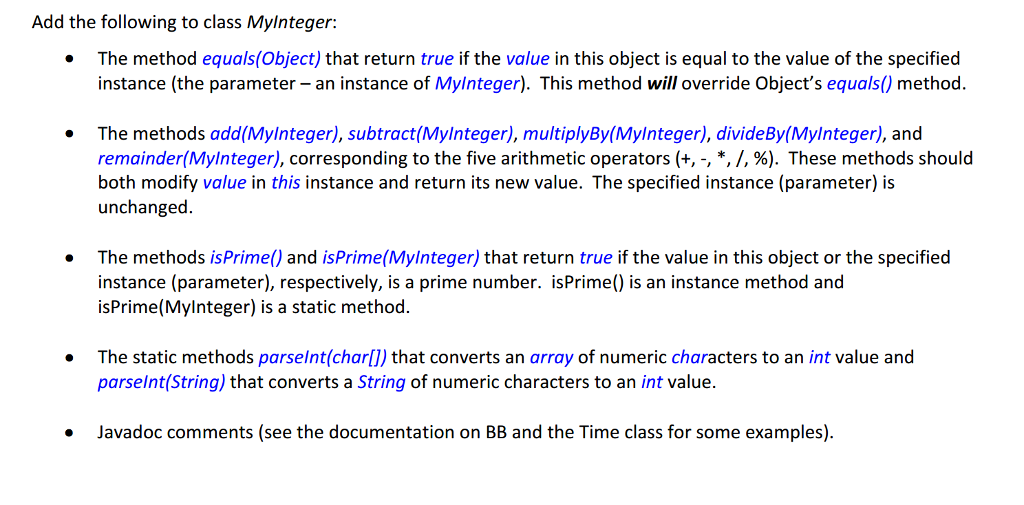Question
public class MyInteger { private int value; public MyInteger(int val) { value = val; } public int getValue() { return value; } public int setValue(int

public class MyInteger {
private int value;
public MyInteger(int val) {
value = val;
}
public int getValue() {
return value;
}
public int setValue(int set) {
value = set;
return value;
}
public boolean equals(int eq) {
if(eq == value) {
return true;
}
else
return false;
}
public String toString() {
String str = Integer.toString(value);
return str;
}
public boolean isZero() {
if (value == 0) {
return true;
}
return false;
}
public boolean isEven() {
if ((value%2) == 0) {
return true;
}
return false;
}
public boolean isOdd(){
if((value%2) == 1) {
return true;
}
return false;
}
public static boolean isZero(int myInt) {
if (myInt == 0) {
return true;
}
return false;
}
public static boolean isEven(int myInt) {
return (myInt % 2) == 0;
}
public static boolean isOdd(int myInt) {
return (myInt % 2) == 1;
}
public static boolean isEven(MyInteger myInt) {
return myInt.isEven();
}
public static boolean isOdd(MyInteger myInt) {
return myInt.isOdd();
}
public int intIncrement() {
return setValue(value + 1);
}
public int intDecrement() {
return setValue(value - 1);
}
public int add(int myInt) {
value = value + myInt;
return value;
}
public int subtract(int myInt) {
value = value - myInt;
return value;
}
public int multiplyBy(int myInt) {
value = value * myInt;
return value;
}
public int divideBy(int myInt) {
value = value / myInt;
return value;
}
public int remainder(int myInt) {
value = value % myInt;
return value;
}
public static void main(String[] args) {
MyInteger int1 = new MyInteger(0);
MyInteger int2 = new MyInteger(-56);
MyInteger int3 = new MyInteger(2);
MyInteger int4 = new MyInteger(23);
MyInteger int5 = new MyInteger(2300);
System.out.printf("%d is zero? %s%n", int1.getValue(), int1.isZero());
System.out.printf("%d is even? %s%n", int2.getValue(), int2.isEven());
System.out.printf("%d is odd? %s%n", int3.getValue(), int3.isOdd());
System.out.println();
System.out.println("Incrementing the value by one, Old value : " + int3.value + " new value " + int3.intIncrement());
System.out.println("Decrementing the value by one, Old value : " + int3.value + " new value " + int3.intDecrement());
System.out.println();
System.out.println("Adding 5 to " + int4.value + " = " + int4.add(5));
System.out.println("Subtracting 5 from " + int4.value + " = " + int4.subtract(5));
System.out.println("Multiplying " + int4.value + " by 5" + " = " + int4.multiplyBy(5));
System.out.println("Dividing " + int4.value + " by 5" + " = " + int4.divideBy(5));
System.out.println("Remainder from / " + int4.value + " by 5" + " = " + int4.remainder(5));
System.out.println();
System.out.printf(" Static 93 is odd? %s%n", MyInteger.isOdd(93));
System.out.printf(" Static 93 is even? %s%n", MyInteger.isEven(93));
System.out.printf(" Static 93 is zero? %s%n", MyInteger.isZero(93));
System.out.printf(" %d Equals %d? %s%n", int1.getValue(), int4.getValue(), int1.equals(int4));
System.out.println("Output in String " + int5.toString());
}
}
Add the following to class Mylnteger: The method equals (Object) that return true if the value in this object is equal to the value of the specified instance (the parameter instance of Mylnteger). This method will override object's equals() method The methods add (Mylnteger), subtract Mylnteger), multiplyBy(Mylnteger), divideBy(Mylnteger), and remainder (Mylnteger), corresponding to the five arithmetic operators These methods should both modify value in this instance and return its new value. The specified instance (parameter) is unchanged The methods is Prime() and is Prime Mylnteger) that return true if the value in this object or the specified instance (parameter), respectively, is a prime number. Prime() is an instance method and is Prime (Mylnteger) is a static method The static methods parselnt(charl) that converts an array of numeric characters to an int value and parselnt(String) that converts a String of numeric characters to an int value Javad oc comments (see the documentation on BB and the Time class for some examples)Step by Step Solution
There are 3 Steps involved in it
Step: 1

Get Instant Access to Expert-Tailored Solutions
See step-by-step solutions with expert insights and AI powered tools for academic success
Step: 2

Step: 3

Ace Your Homework with AI
Get the answers you need in no time with our AI-driven, step-by-step assistance
Get Started


